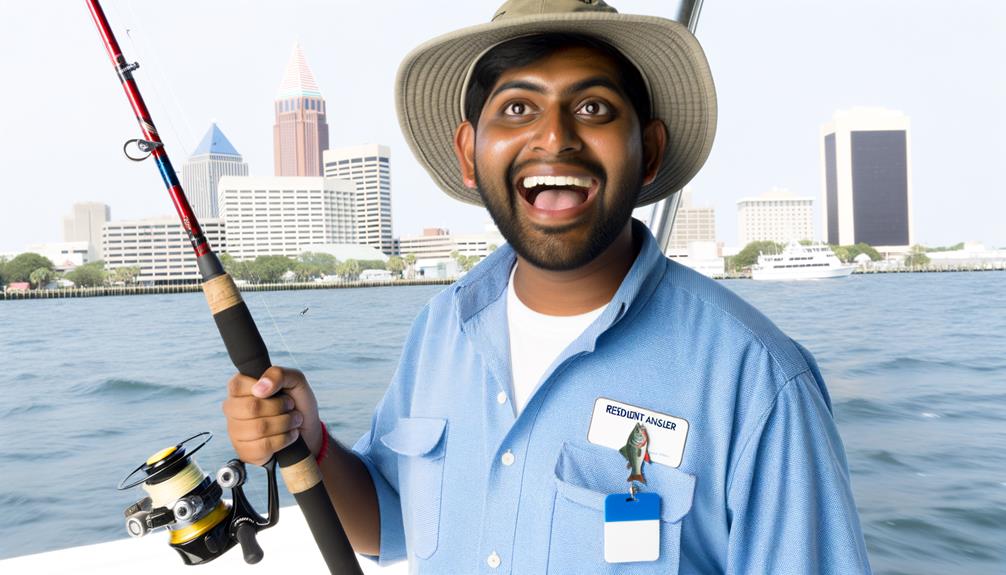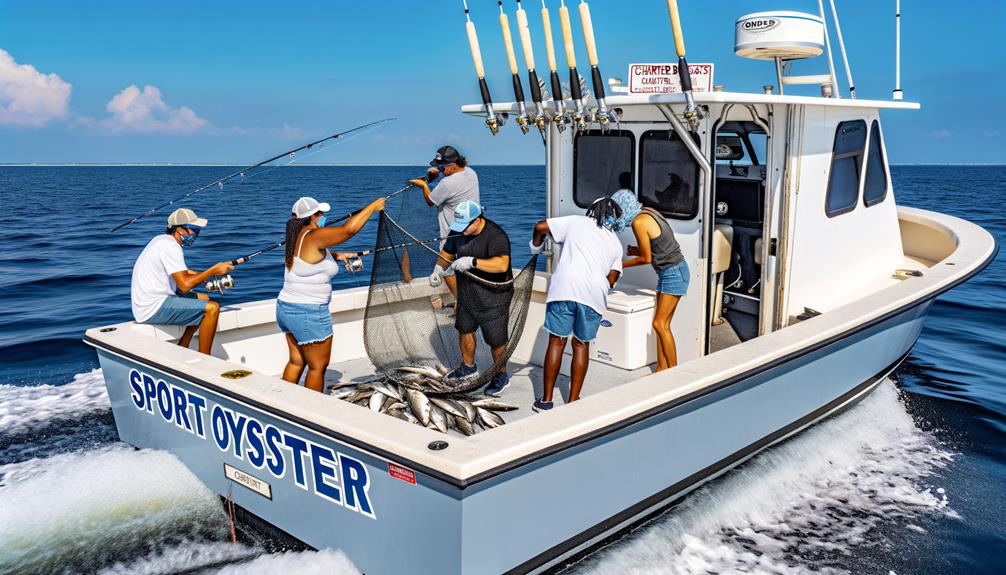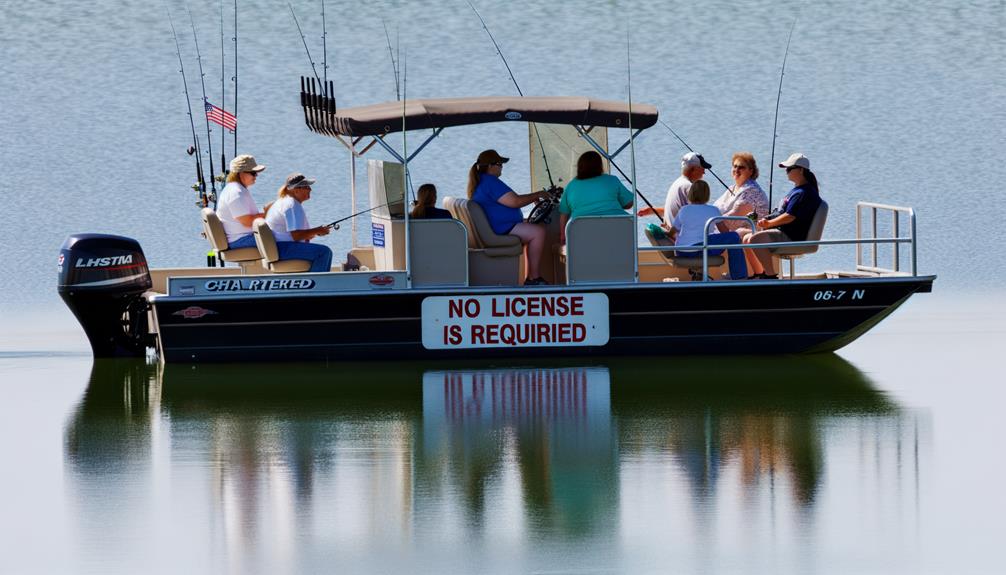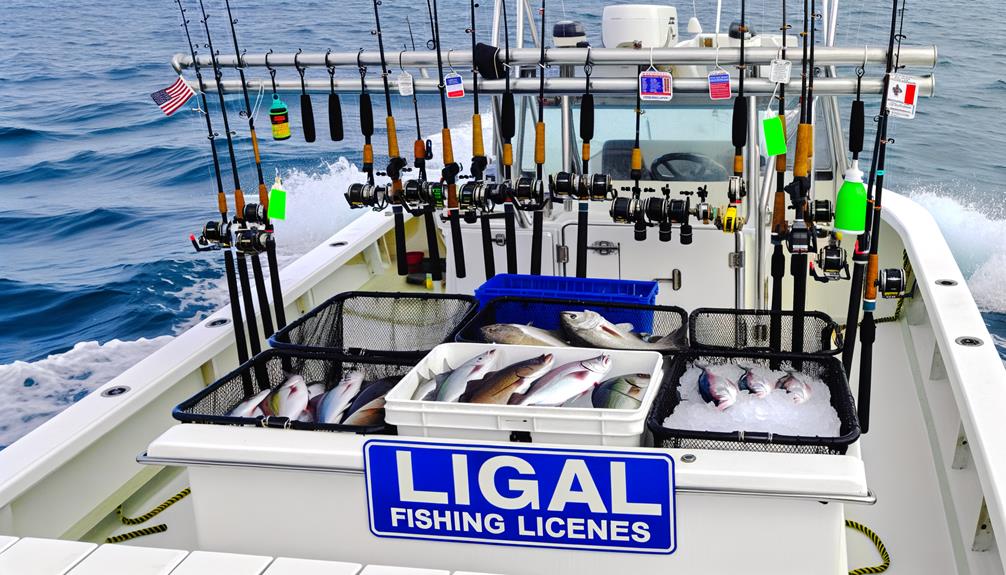Did you know that over 49 million Americans participate in freshwater, saltwater, and fly fishing each year?
As you prepare for your next fishing trip, you might be wondering about the licensing requirements, particularly if you're planning to charter a boat.
Is a personal fishing license necessary, or does the charter boat's license suffice?
There's more to this than meets the eye, so let's delve into the specifics and unravel these fishing regulations together.
Key Takeaways
- Charter boat operators usually hold all necessary licenses and permits for fishing trips, but it is important to confirm with the operator to ensure coverage under their license.
- Different licenses may be required for guiding on specific waterways, such as Army Corps lakes, and a valid saltwater fishing license is required for commercial oyster fishing on a charter boat.
- Offshore fishing licenses are required for charter boats operating offshore, and an all-water fishing guide license is necessary for operating on public waterways.
- Fishing licenses are required for anglers, with different requirements depending on age, residency, and origin, but there are exemptions for certain categories such as seniors and individuals with disabilities.
Understanding Charter Boat Fishing
When you opt for charter boat fishing, you typically don't need to secure your own fishing license, as the charter boat operator usually holds all necessary licenses and permits for the trip. This convenience is one of the many benefits of choosing a fishing charter. The charter operator is responsible for fulfilling all legal requirements, allowing you to focus solely on the fishing experience.
However, it's vital to confirm this with your charter operator, as licensing requirements might vary depending on the location and type of fishing. In most cases, you're covered under the charter boat's license, but it doesn't hurt to double-check.
While fishing on charter boats usually doesn't require you to have a personal license, it's always advisable to be informed. Ask your charter operator about the specifics before the trip. By doing so, you ensure that you're part of a responsible and legal fishing community.
Fundamentals of Fishing Licenses
Navigating the fundamentals of fishing licenses is crucial for any prospective fishing guide, especially in a state like Texas where specific licenses and permits are needed. As you delve into the world of charter fishing, understanding the different licenses is paramount.
In Texas, fishing guides need a specific license. You have two main types to choose from – all-water and freshwater. The all-water license, as the name suggests, allows you to guide in both saltwater and freshwater. The freshwater license, on the other hand, only permits guiding in freshwater bodies. These licenses cost $132 and are valid for one year.
If you're planning to guide on Texas' navigable public rivers, most require an all-water license. However, always double-check with the Texas Parks and Wildlife Department for specific requirements. And for those considering guiding on Army Corps lakes, you'll need a permit. Reach out to the district in charge of the lake for the application process.
Understanding these fundamentals of fishing licenses ensures you're prepared, legal, and ready to provide an amazing charter fishing experience.
Rules for Resident Anglers

While understanding the licensing requirements for charter fishing guides is important, it's equally crucial for resident anglers to be aware of their own set of rules and regulations in Texas' public waters. As a resident angler, you're required to have a resident fishing license, unless you fall into an exempt category.
Here are some key points you should know:
- Unless you're under 17, born before 1931, or an individual with intellectual disabilities participating in supervised fishing, you need a license to fish in Texas public waters.
- Your license must carry a freshwater or saltwater endorsement, depending on where you'll be fishing.
- There are special packages available, such as the senior freshwater package for those over 65.
Requirements for Non-Resident Anglers
Just as resident anglers have their regulations, non-residents must also adhere to specific requirements when fishing in Texas public waters. It's essential for you to familiarize yourself with these to ensure a seamless fishing experience on the local fishing charters.
You're required to possess a non-resident fishing license, regardless of whether you're a resident or non-resident. There are, however, exceptions. Non-residents under 17 are exempt from this requirement, which is quite a relief for families who enjoy fishing together.
| Exemption | Age & Origin |
|---|---|
| Yes | Under 17, Any Origin |
| Yes | 65+, Louisiana |
| Yes | 65+, Oklahoma |
| No | Others |
The table above clearly outlines the license requirements. If you're over 65 and hail from Louisiana or Oklahoma, you're also in luck. Your states have reciprocal agreements with Texas, so your licenses are valid there.
Understanding and adhering to these requirements not only ensures your compliance with Texas law but also fosters a sense of belonging within the wider fishing community. After all, being part of a group means playing by the rules. Remember, knowledge is power, and it's always better to be safe than sorry.
Usage of Sport Oyster Boat Licenses

Now that you're well-versed with the license requirements for non-resident anglers, let's shift our focus to the specifics of operating a charter boat, particularly those with a Sport Oyster Boat License.
This type of license is a special permit for commercial fishing on a charter boat, specifically for oysters.
- The first thing to know is that a Sport Oyster Boat License allows you to engage in commercial oyster fishing, so long as you meet the necessary requirements. This includes having a valid saltwater fishing license, which permits you to operate in both saltwater and freshwater bodies.
- Secondly, you must comply with USCG License regulations. This means your charter boat must meet certain safety standards and you must have the necessary insurance coverage.
- Lastly, remember that the Sport Oyster Boat License costs $132 and is valid for one year. However, you must be of a certain age and have specific experience in saltwater fishing.
Offshore Fishing: Licenses and Regulations
When you're fishing offshore, it's critical to understand the licensing rules for charter boats and the regulations that govern this activity.
Navigating these rules can be complex, but they're designed to protect both you and the marine environment.
Let's clarify how these licenses and regulations apply to your offshore fishing ventures.
Charter Boat Licensing Rules
Navigating the realm of charter boat licensing rules is crucial for your offshore fishing activities, as regulations can vary greatly depending on location and specific fishing activities. Licenses are required, whether you're a guide or passenger.
In Texas, for instance, an All-Water Fishing guide license is essential for operating on public waterways. It's your license to fish in any water bodies.
If your charter operates on non-navigable waters, a freshwater license will suffice.
Consider also boat insurance. While not a legal requirement, it's recommended to protect your boat, business, and customers.
Understanding the rules of charter boat licensing can enhance your fishing experience, ensuring you're always on the right side of the law.
Understanding Offshore Regulations
Understanding offshore regulations is key to your fishing ventures, particularly when it comes to offshore fishing licenses and regulations. When you're on a charter boat, knowing these rules is crucial.
A USCG Masters License is needed for offshore fishing. This license ensures you're competent to handle the demands of the sea and abide by offshore regulations. It's not simply about casting a line; it's about navigating legal waters too.
It's vital to identify if you're fishing in navigable waters, as different licenses are needed. Ensure your charter boat is registered and insured, as these are mandatory requirements.
Exemptions to the License Rule

Despite the general rule, you'll find several exceptions where a fishing license isn't necessary. Especially if you're a Texas resident, there are unique exemptions to the license rule.
- Age-based Exemptions: If you're under 17 or born before January 1, 1931, you won't need a fishing license to fish in Texas public waters.
- Therapeutic Exemptions: Individuals with an intellectual disability who are part of a medically approved therapy or under the supervision of a licensed angler don't require licenses.
- Charter Boat Exemptions: If you're a paying guest on a charter boat in Alabama, Florida, or Louisiana, you're allowed to fish without a license.
As a Guide, it's crucial to be aware of these exemptions to inform your guests correctly. Remember, these exemptions are specific to certain states and situations. If you're unsure whether an exemption applies to you, it's best to check with the local authorities.
Be a responsible angler and ensure you're following all regulations. After all, fishing is about more than just catching fish; it's about being part of a respectful, law-abiding community of outdoor enthusiasts.
Charter Boat Licenses: Covered or Required?
When planning a deep sea fishing charter, you might question whether you need a license or if the charter boat's license covers you. However, licensing responsibilities vary by state, and it's essential to understand these regulations.
Always check the fish and wildlife website of the state you plan to fish in to ensure you're covered or to identify if any exemptions apply.
Understanding Charter Boat Licenses
To operate as a fishing guide in Texas, you'll need to secure a fishing guide license, which comes in two specific types and is priced at $132 for a one-year validity. Your choice of license depends on where you'll conduct your guide service, whether it's deep sea or freshwater recreational fishing.
- All-Water Guide License: Ideal if you'll be leading excursions in both saltwater and freshwater bodies.
- Freshwater Guide License: Suitable if you're exclusively operating in freshwater bodies.
- Party Boat Operator License: You'll need this if you're operating a larger vessel catering to multiple anglers.
It's essential to understand these licenses to operate legally and cater to the angling community effectively. Be informed, be compliant, and enjoy your time on the water!
Licensing Responsibilities on Charters
As a fishing guide in Texas, you're accountable for understanding and fulfilling your licensing responsibilities, which can vary depending on the type of waters and fishing activities your charter boat is involved in.
If you're navigating navigable rivers, you'll need an all-water license. On non-navigable waters, a freshwater license suffices. Besides these STATE fishing licenses, secure boat registration and consider boat insurance for your operations.
Curious about whether do you need a fishing license on a charter boat? Yes, for specific activities and locations, additional permits may be required. For instance, Texas saltwater fishing could demand extra licenses.
Fishing in the Gulf: What You Need

Before you cast your line into the Gulf's abundant waters, it's crucial to understand Texas's specific licensing requirements, boat registration procedures, and insurance recommendations for fishing operations. When fishing in the Gulf, it's also essential to know the types of fishing license required.
- Fishing Guide License: Texas requires two types of fishing guide licenses – all-water and freshwater. Navigable waters may need an all-water license, while non-navigable waters may only require a freshwater license.
- Boat Registration: The Texas Parks and Wildlife Department requires boat registration. This is especially important for charter boat operations and party boat activities.
- Insurance: Although not legally required, boat insurance is strongly recommended. It provides financial protection in case of unexpected incidents.
Navigating Exceptions and Special Cases
Navigating the waters of fishing license exceptions and special cases can be complex. Understanding charter boat license regulations and assessing special license cases will keep you on the right side of the law.
Let's clarify these complexities to ensure a smooth sailing fishing trip.
Charter Boat License Regulations
When you're preparing to navigate the complex world of charter boat license regulations, you'll need to understand the exceptions and special cases, such as different requirements for specific locations and activities. Your status as a Texas resident, for instance, could affect these requirements.
- Guide Fishing: You'll need a fishing guide license, which comes in all-water and freshwater categories. Your operation location determines which one you need.
- Boat Registration: Registering your boat with the Texas Parks and Wildlife Department is a must. Although optional, having boat insurance is highly recommended.
- Specific Activities: Different activities, such as scuba or kayak-based fishing, may require additional permits.
Assessing Special License Cases
In the intricate world of charter boat licensing, you'll also need to consider special situations and activities that require additional licenses or permits. When assessing special license cases, keep in mind that fishing trips involving guide operations, scuba charter boats, and kayak-based fishing guides often necessitate unique permits.
For instance, Army Corps lakes may require a permit for commercial trips. Moreover, resident and non-resident fishing licenses have exceptions based on age, disability, and state of residency. Different fishing license packages are available, suiting all kinds of needs.
Understanding these nuances enables you to navigate the complexities of charter boat fishing licenses effectively, ensuring a compliant and enjoyable fishing experience.
Understanding Fishing License Exceptions
Diving into the realm of fishing license exceptions, you'll find that understanding these rules is crucial for a hassle-free charter boat fishing experience.
It's important to note that:
- The need for a fishing license on a charter boat is often waived. The operator usually covers this, allowing you to enjoy your offshore trip without worrying about individual permits.
- Navigable waters present a unique case. In some areas like Texas, fishing guides may need an all-water license for public rivers, while non-navigable waters demand a freshwater license.
- Insurance isn't mandatory for boats, but it's recommended, especially for party boat operations, to protect the business and its customers.
Frequently Asked Questions
Do You Need a Fishing License in Florida if Your on a Charter Boat?
In Florida, you're covered under charter exceptions. So, if you're on a licensed charter boat, you don't need an individual fishing license. It's always good to know Florida's regulations to avoid any fines.
Does Everyone on a Boat Have to Have a Fishing License in Texas?
Ironically, in the Lone Star State, everyone on a boat needs a fishing license. No license exemptions exist, not even on charter boats. Enforcement procedures are strict, so obtain your license to belong among the anglers.
Does Everyone on the Boat Need a Fishing License in California?
In California, license regulations dictate that everyone aboard a charter boat engaging in recreational fishing needs a license, except for some license exemptions. Check the charter's policies to ensure you're in compliance.
Does Everyone on a Boat Need a Fishing License in Ny?
Yes, you do. In NY, license regulations dictate that everyone on board a boat needs a fishing license. NY fishing rules are clear as crystal, no matter your location, fishing without a license is illegal.
Conclusion
In conclusion, when you're reeling in that big catch, it's the charter boat that's got your license covered, not you.
Still, it's smart to check with your charter company beforehand. Be it resident angler rules, non-resident requirements, or special cases, staying informed is key.
So, whether you're angling in the Gulf or sporting an oyster boat license, knowing the exceptions and understanding the laws will ensure you enjoy a smooth, hassle-free fishing adventure.
